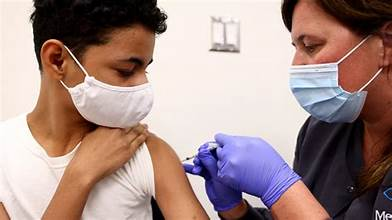
Table of Contents
Back-to-School Immunizations: What Parents Need to Know About Vaccines This Year
As summer winds down and the new school year approaches, ensuring that children are up-to-date on their vaccinations is a crucial task for parents. Vaccinations play a vital role in protecting children’s health and preventing the spread of infectious diseases within schools and communities. Here’s a comprehensive guide on what parents need to know about back-to-school immunizations for the upcoming year.
1. Importance of Vaccinations
**1. *Disease Prevention:*
- Protecting Individual Health: Vaccinations protect children from a range of potentially serious diseases, including measles, mumps, rubella (MMR), polio, and whooping cough. These diseases can have severe consequences, particularly for young children and those with compromised immune systems.
- Community Immunity: Vaccines also contribute to community immunity, or herd immunity. When a significant portion of the population is vaccinated, it helps protect those who cannot be vaccinated, such as infants, pregnant women, and individuals with certain medical conditions, by reducing the overall prevalence of disease.
**2. *School Requirements:*
- Compliance with State Laws: Most states have specific vaccination requirements for children attending public and private schools. These requirements are designed to minimize outbreaks and ensure a safe environment for all students.
- Avoiding Exclusions: Keeping vaccinations up-to-date helps avoid exclusion from school due to non-compliance with immunization requirements. Schools often require proof of vaccination before a child can start or return to classes.
2. Vaccines Recommended for School-Aged Children
**1. *Routine Vaccinations:*
- MMR (Measles, Mumps, Rubella): Typically given in two doses, the MMR vaccine is crucial for preventing these highly contagious diseases. The first dose is usually administered around 12-15 months of age, with a second dose between 4-6 years.
- DTP/DTaP (Diphtheria, Tetanus, Pertussis): The DTaP vaccine is given in a series of five doses, starting at 2 months of age and finishing by 4-6 years. It protects against diphtheria, tetanus, and whooping cough.
- Polio (IPV): The polio vaccine is given in four doses, typically starting at 2 months of age and concluding by 4-6 years. It protects against polio, a virus that can cause paralysis and other serious complications.
- Varicella (Chickenpox): The varicella vaccine is usually given in two doses, the first between 12-15 months and the second between 4-6 years. It protects against chickenpox, which can cause serious skin infections and complications.
**2. *Adolescent Vaccinations:*
- Tdap (Tetanus, Diphtheria, Pertussis): An updated version of the DTP vaccine, the Tdap booster is recommended for adolescents at age 11-12. It helps protect against these diseases as immunity from earlier vaccinations wanes.
- HPV (Human Papillomavirus): The HPV vaccine is recommended for preteens aged 11-12, with a series of two or three doses depending on the age of the first dose. It protects against cancers caused by human papillomavirus, including cervical cancer and some other genital cancers.
- Meningococcal Vaccine: This vaccine protects against meningococcal disease, which can cause severe bacterial infections including meningitis. The first dose is recommended at age 11-12, with a booster dose at 16 years.
**3. *Seasonal Vaccinations:*
- Influenza (Flu) Vaccine: Annual flu vaccination is recommended for all children aged 6 months and older. The flu vaccine helps protect against seasonal influenza, which can be particularly severe in children.
3. New Developments and Considerations
**1. *COVID-19 Vaccines:*
- Eligibility and Recommendations: As of 2024, COVID-19 vaccines are recommended for children aged 6 months and older. Parents should check with their healthcare provider for the latest guidelines on COVID-19 vaccinations, including booster doses if recommended.
- Impact on School Health Policies: Schools may have specific guidelines regarding COVID-19 vaccinations, including requirements for attending in-person classes and participating in extracurricular activities.
**2. *Changes in Vaccine Schedules:*
- Updated Recommendations: Vaccine schedules and recommendations can change based on new research and public health guidelines. It’s essential for parents to stay informed about any updates to vaccination schedules and requirements.
4. Addressing Common Concerns
**1. *Safety and Side Effects:*
- Vaccine Safety: Vaccines undergo rigorous testing for safety and efficacy before being approved for use. Common side effects are usually mild, such as a sore arm or low-grade fever, and are short-lived.
- Addressing Fears: Parents with concerns about vaccine safety should consult with healthcare professionals. Reliable sources of information include the Centers for Disease Control and Prevention (CDC) and the World Health Organization (WHO).
**2. *Vaccine Exemptions:*
- Medical Exemptions: Some children may be exempt from certain vaccines due to medical conditions. Documentation from a healthcare provider is typically required to support medical exemptions.
- Religious and Philosophical Exemptions: Many states allow for religious or philosophical exemptions, though the criteria and processes vary. Parents should be aware that opting out of vaccinations may lead to increased risks of disease and, in some cases, exclusion from school.
5. Practical Tips for Parents
**1. *Scheduling Appointments:*
- Plan Ahead: Schedule vaccinations well in advance of the school year to ensure that your child’s immunizations are up-to-date. Many healthcare providers offer appointment scheduling online or via phone.
- Bring Documentation: Ensure you bring your child’s vaccination records to appointments so that any necessary updates can be made and documented.
**2. *Staying Informed:*
- Check School Requirements: Review your child’s school or district’s vaccination requirements to ensure compliance. Schools often provide information on necessary vaccines and deadlines for submission.
- Consult Healthcare Providers: Regularly consult with your child’s pediatrician or family doctor to stay updated on vaccination schedules and any new recommendations.
6. Conclusion
Back-to-school immunizations are a vital aspect of preparing children for the upcoming school year. By keeping vaccinations up-to-date, parents play a crucial role in safeguarding their children’s health and contributing to public health efforts. Understanding the importance of vaccines, staying informed about recommended immunizations, and addressing any concerns with healthcare professionals can help ensure a healthy and successful school year for children. As the school year approaches, taking these steps will help protect not only individual students but also the broader community.







